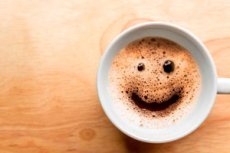New publications
Nighttime caffeine consumption causes impulsive behavior
Last reviewed: 09.08.2025

All iLive content is medically reviewed or fact checked to ensure as much factual accuracy as possible.
We have strict sourcing guidelines and only link to reputable media sites, academic research institutions and, whenever possible, medically peer reviewed studies. Note that the numbers in parentheses ([1], [2], etc.) are clickable links to these studies.
If you feel that any of our content is inaccurate, out-of-date, or otherwise questionable, please select it and press Ctrl + Enter.

Scientists from the University of Texas at El Paso and the University of Illinois, led by Eric B. Saldes, published a study in iScience in which they showed for the first time that caffeine taken at night reduces the ability to suppress unwanted motor responses and causes impulsive behavior in fruit flies (Drosophila melanogaster).
Why is this important?
Caffeine is the most widely consumed psychostimulant in the world. It is consumed not only in the morning, but also at night to cope with shifts, studying or being on duty. However, the effects of nighttime caffeine on cognitive functions and behavioral control have remained poorly understood.
Design and methods
- Model: Drosophila is a recognized genetic object for studying the neural mechanisms of behavior.
- Conditions of administration: feeding with caffeine solution during daytime (ZT2–10) or nighttime (ZT14–22) hours; control – without caffeine.
- Impulsivity test: mechanical air puff (aversive air puff). Normally, flies stop moving when a strong air flow occurs; in those who received caffeine at night, the inhibition reaction was impaired.
- Activity and sleep control: walking speed was not altered, and artificial sleep deprivation (by light or shaking) did not produce similar defects, excluding general hyperactivity or sleep deprivation.
Main findings
Impulsive movement only with night caffeine.
- Caffeine during the day had no effect on the flies' ability to inhibit movement.
- During the night, impulsivity (fraction of responses, pain to resist) increased by 40–60%.
Gender differences.
Females showed greater impulsivity (+70%) compared to males (+30%), despite comparable caffeine levels in the body.
Circadian modulation.
By blocking circadian genes (clock, cycle), scientists eliminated the difference between daytime and nighttime consumption, indicating a “window of vulnerability” at night.
Dopamine as a mediator.
- Decreased dopamine synthesis (pale/+ mutants) or silencing of PAM-dopaminergic neurons abolished the effect of caffeine on impulsivity.
- Dopamine transporter mutants (fumin/+) increased impulsivity.
The role of the D1 receptor in the fly brain.
Targeted destruction of the dDA1/Dop1R1 receptor in the α/β and γ-lobes of the mushroom body completely blocked the caffeine effect. The γ-lobule was the most sensitive.
Mechanisms
According to the authors, at night, increased sensitivity of the dopamine system in key nerve nodes and a “window” of increased permeability of caffeine disrupt inhibitory neural circuits, which leads to impaired motor control.
Statements by scientists
"We showed that caffeine has different effects depending on the time of day and gender. These effects are mediated by dopamine and the circadian clock," Saldes says.
"The findings have implications for those who work at night or need coffee to stay awake: Not only may sleep be affected, but so may impulse control," adds co-author Paul R. Sabandal.
Prospects
The authors emphasize the need for clinical studies in humans, particularly among shift workers, military personnel, and health care workers, to determine:
- Does drinking caffeine at night increase the risk of making rash decisions and mistakes?
- Are there similar gender differences in humans?
- How to relate sleep doses and chrono-regimes to the risk of impulsive behavior.
This work opens the way to personalized caffeine consumption recommendations based on time of day, gender, and individual chronotypes.
